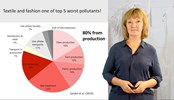Saving the world? How CSR practitioners live their calling by constructing different types of purpose in three occupational stages
In an effort to better understand meaningful work, “calling” has recently gained momentum among scholars. Defined as an orientation toward work, characterized by a strong sense of purpose and a prosocial motivation beyond self-gain, a calling is often attributed to work that addresses human and environmental (hereafter: social) issues, and is therefore seen as more than “just a job”. A calling is inherently ethical as it allows individuals to accomplish their prosocial ambition, and it needs to be lived for work to be perceived as meaningful.
However, debate remains as to whether individuals change or maintain their calling. Little is known as to whether individuals live their calling differently in different occupational stages. This debate finds its roots in the modern formulation of a calling as an orientation toward work, where the purpose is derived after a long and self-oriented journey of “searching for” and then “finding” it.
The study offers a qualitative analysis of the CSR occupation through interviews with 57 CSR practitioners employed by 52 Swedish international companies and who are living their calling. By positioning the study in line with broader conversations on micro-CSR (when CSR activities are communicated at a micro-level in an organization, encouraging employees to develop pro-environmental behaviors), the authors draw attention to the CSR occupation as an ideal setting to study meaningful work, asking: How do the CSR practitioners who are living their calling construct the purpose of their work?
The study demonstrates that individuals, as they live their calling in different occupational stages, differently construct the purpose of their work. By conceptualizing activistic, win–win and corporate purpose from the case of the CSR occupation, the authors show that individuals holding the same calling can live it in multiple ways, and that a calling is an inherently challenged and malleable orientation associated with different types of purpose. The study also shows that individuals differently perceive and respond to tensions in the organization depending on whether they are in the early-, mid- and late-stage of their occupation. Finally, through drawing on the lived experiences of CSR practitioners in three occupational stages, the study provides an account of the problem of the commodification of CSR work.
Implications for the future of work and business ethics
"Our article exposes the harmful consequences of companies’ failure to live up to CSR practitioners’ social aspirations and the over prioritization of commercial goals. How companies will value and respond to CSR practitioners’ social aspirations in the future will be increasingly fundamental to ensure that they maintain the spirit, motivation and passion for social change that lies at the foundation of CSR work’s meaningfulness. At the same time, understanding and prioritizing the social goals of CSR work will become a pragmatic issue in addition to a moral obligation because of the need to recruit and train professionals." - Enrico Fontana
Authors
- Enrico Fontana, Senior Lecturer of Sustainable Business at Cranfield School of Management, Cranfield University; Affiliated Researcher at Mistra Center for Sustainable Markets, Stockholm School of Economics; Visiting Fellow at Sasin School of Management, Chulalongkorn University.
- Sanne Frandsen, Associate Professor and Senior Lecturer, Department of Business Administration, Lund University.
- Mette Morsing, Professor, Copenhagen Business School; Visiting Professor at Mistra Center for Sustainable Markets, Stockholm School of Economics.




